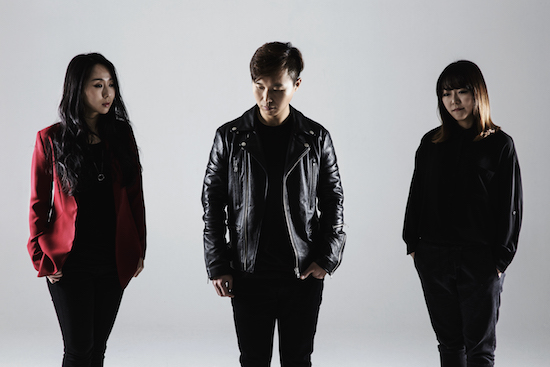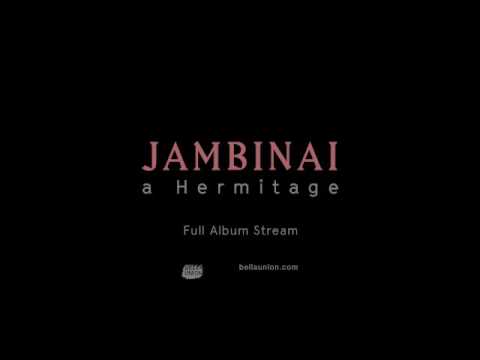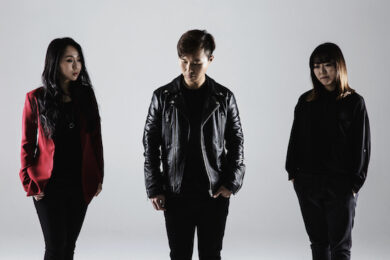Jambinai are a band caught in a magnificent middle ground. They are at once both traditionalists and uncompromising boundary pushers, combining instruments of their native South Korea like the haegeum fiddle and the zither-like geomungo, with the most ferocious of Western post-rock. The result is shattering, an amorphous, distorting listen that surges from savage direct hits of jagged, metal barbs to cascading, long-form landscapes.
The outfit’s founding trio, Bomi Kim, Eun Youg Sim and Ilwoo Lee, met at the prestigious Korea National University of Arts in Seoul, an institution known for fostering strict devotion to the finer delicacies of the country’s musical tradition. Yet as Lee, the chief songwriter and de facto leader of the outfit soon found, there was something lacking: "When I played shows of [just] Korean traditional music, the audience was only my friends who majored in Korean traditional music and their families, or teachers and professors. They were the only audience we had, then after the show there was no more interest."
The band formed with the intention of lifting the traditional style beyond fussy over-intellectualism to say something to a more contemporary audience. "Most musicians, they communicate with the ordinary person. We really wanted to be like that, we really want to be musicians who communicate with ordinary people, so we made Jambinai, music that’s modern and for ordinary people but with Korean traditional instruments."
Musicians in Korea have attempted to modernise their nation’s tradition of Gugak (as opposed to yangak, the now-pervasive ‘Western style’) before, yet in doing so sacrifice any edge of progression in favour of a more palatable approach of easy listening. As Lee continues, "we’re not just trying to make it popular sounding. Many Korean traditional bands try to mix with modern music, but they just try to mix with jazz or acoustic sounds, not like us. They really just want to make beautiful sounds with traditional instruments. We don’t. I like noise, I like heavy metal. That’s why we play like that."
Jambinai’s music is another kind of beautiful, an intense cacophony of two cultures brought together, not for one to merely prop up the other, but to give Korean tradition a new, visceral importance courtesy of altogether different outside influences. Lee cites the heavy metal of Metallica and Black Sabbath as his earliest inspiration, bands popular in Korea, introduced to him by his brother as a teenager. "Then I searched and listened to all the Western heavy metal and rock & roll, and post-rock bands. Explosions In The Sky, Mogwai, Sigur Rós… There are a lot of bands that influence me, mostly progressive and experimental bands."
The importance of his cultural history was also instilled in Lee at adolescence, with the musician pushed onto the piri, a traditional flute made from bamboo, by his mother at the age of 13. "[At first it] was not my will to play the piri, it was my mother’s. I had to know the Korean music, know the traditional roots, but when I started I really didn’t like to play that instrument. I also didn’t like the Korean traditional music, I was like the ordinary person today. But after playing I started to become a little interested, and then the interest increased and increased."
Finding their feet after nebulous early sessions at university, Jambinai’s first Korean audiences were almost as unaccustomed as those in the West to their unconventional instrumentation. "Mostly, Korean people don’t know about traditional music, they feel very strangely about our instruments. They also don’t know about traditional culture nowadays, they really get used to Western culture even though we are living in an Asian country. All they listen to is rock, pop, hip-hop and electronic music, and then, when they hear the old traditional instruments and music, it feels strange to them."
Initially, too, their audiences at home were relatively subdued in the face of their abrasive live set – "they reacted like Jambinai was just a traditional band, so they just clapped their hands after we played and that was all" – but found more fervent reception in an unsuspecting West, where they sought to prove a depth beyond common conceptions of Korean music. "In the Korean government they really push K pop to other countries, so that’s why the UK will only know about Korean pop as that. I understand, and I don’t necessarily want to change that, I just want people in other countries, when they listen to our music, they realise, ‘Oh, there are different kinds of bands in Korea’, that we have all kinds of music.
"European people gave us more attitude and a bigger vibe than Korean people when we played there for the first time," he continues, but it wasn’t long until the word of mouth fervour that spread in the wake of that first round of European shows made its way back home. "From this year the Korean people have started to give us really good energy, so nowadays it’s not too different [between audiences]. After two years of European tours it’s changed the Korean audience. They’ve checked out our show on YouTube or Facebook or Twitter, they started to yell, to add some atmosphere."
Most significant among those to hear of the band in the wake of those first live sets was Bella Union. There’s a glint of boyish enthusiasm in Lee’s voice when the label’s name is mentioned, having released many of those formative records he’d explored in his youth. "Before we signed I knew about Bella Union just as the Flaming Lips, Explosions In The Sky. We have more shows in Europe than Korea and needed to find a label to release our material in the UK or Europe. It took a long time, maybe two or three years, but when we had a lot of shows in Europe some news about Jambinai goes from this person to this person, to people who work in the music business. News gets to labels and finally it went to Bella Union. When I heard that news I was so, so thrilled."
A Hermitage, their first record with the label, following 2012’s debut Différance, appeared last month, a challenging listen for both its ruthless instrumentals and scattered moments of vocal, political ferocity. They’re at their very finest, for example, on ‘They Keep Silence’, the record’s closing track, about the sinking of the Sewol ferry in 2014, which claimed 306 lives, the majority of them high school children. The Korean government drew vitriol for their silence in the face of widespread public condemnation for their handling of the tragedy, their tone defensive and dismissive even as the previously popular prime minister Jung Hong-won resigned amid plummeting support. "Lots of artists and young people in Korea wrote about the sadness, [but I wanted] to write about the anger, how they do nothing, how they still keep silent," says Lee of the track.
‘Abyss’, meanwhile, exemplifies Lee’s constant desire for progression, to augment and enhance the band’s clashes of texture with the introduction of stern, looming hip-hop. "I’m a really big fan of heavy metal, so I’ve already blended with metal, but I’m also a really big fan of ’90s hip-hop, so when we started after the first album I thought, I’m going to mix that in too."
To the hitherto dismissive, traditionalist or simply uninitiated, Jambinai have little left to prove, yet it says much about the ethos at the core of the band that their focus will forever be progression, to explore new avenues of genre into which they can expand. As well as a deeper foray into the avenues of hip-hop sketched out on A Hermitage, "next time, or at least some time, I’m going to mix with electronic music and dance," Lee asserts. As for the end game? "We want to be famous," he says. "To have bigger and bigger audiences, to make a better album next time, and continuously after that; that’s my goal."
A Hermitage is out now on Bella Union




